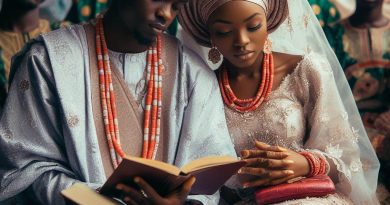Marriage to a Nigerian: Steps to Secure Citizenship
Last Updated on January 28, 2024
Introduction
Let’s explore marriage to a Nigerian: Steps to secure citizenship.
Obtaining Nigerian citizenship through marriage is a significant and beneficial process.
Marriage is a profound union that not only binds two individuals but also often bridges cultures, traditions, and in some cases, legal systems.
For those who have entered into matrimony with a Nigerian citizen, it opens a unique avenue towards acquiring Nigerian citizenship.
This process, while potentially transformative, requires a clear understanding of the steps involved, the legal requirements, and the application process.
It opens doors to various opportunities and privileges.
In this comprehensive guide, we will walk you through the intricacies of securing Nigerian citizenship through marriage, providing you with the essential knowledge and steps to navigate this important journey with confidence and ease.
From eligibility criteria to documentation, we will cover every facet to ensure you embark on this path well-prepared and informed.
Let’s embark on this journey together and explore the steps to securing Nigerian citizenship through marriage.
Understanding Nigerian Citizenship Laws
When it comes to obtaining Nigerian citizenship through marriage, there are certain laws and regulations that need to be understood.
It is important for foreign individuals to be aware of the eligibility requirements and any limitations or conditions associated with acquiring citizenship in Nigeria.
Basic Laws and Regulations
- Under Nigerian law, marriage to a Nigerian citizen does not automatically grant citizenship to the foreign spouse.
- The Nigerian Constitution provides guidelines for citizenship acquisition, including through marriage.
- Nigerian citizenship can be acquired by registration or naturalization.
- The Nigerian Immigration Act governs the process of obtaining citizenship through marriage.
Eligibility Requirements
- Foreign individuals who have been married to Nigerian citizens for at least two years are eligible to apply for citizenship.
- The marriage must be recognized under Nigerian law, meaning it should be valid and legally binding.
- The applicant must be of good character and have a clean criminal record.
- The foreign spouse must show a genuine intention to reside in Nigeria and must have been living together with their Nigerian spouse.
Conditions and Limitations
- Foreign spouses who wish to acquire Nigerian citizenship must renounce their previous nationality. Dual citizenship is not recognized in Nigeria.
- The Nigerian spouse must provide written consent for their foreign spouse to acquire citizenship.
- The application process for citizenship through marriage can be lengthy and requires submitting relevant documents and attending interviews.
- It is important to note that the Nigerian government has the right to reject applications if there are reasonable grounds for doing so.
Benefits of Acquiring Nigerian Citizenship
- Once Nigerian citizenship is acquired through marriage, the foreign spouse enjoys the same rights and privileges as any other Nigerian citizen.
- This includes the right to own land and property, work without the need for a work permit, and access to government-funded healthcare and education.
- Nigerian citizens also have the right to participate in elections and hold public office.
Understanding Nigerian citizenship laws is crucial for foreign individuals who seek to acquire citizenship through marriage.
It is important to fulfill the eligibility requirements and be aware of any limitations or conditions associated with the process.
Acquiring Nigerian citizenship can provide various benefits and opportunities for the foreign spouse, ensuring their integration into Nigerian society.
Finding a Suitable Nigerian Partner
When it comes to marriage and securing citizenship in Nigeria, finding a suitable Nigerian partner is crucial for a successful journey.
A compatible partner will not only enhance your chances of obtaining citizenship but will also contribute to a fulfilling and lasting marriage.
The Importance of Finding a Suitable Nigerian Partner
- Shared Goals and Values: A suitable Nigerian partner will share similar goals and values, ensuring a strong foundation for your marriage and journey towards citizenship.
- Support and Understanding: A compatible partner will provide emotional support and understanding as you navigate through the citizenship process, making the journey easier.
- Language and Cultural Barrier: A Nigerian partner can help you overcome language and cultural barriers, which are essential for a successful integration into Nigerian society.
- Family Acceptance: Finding a partner who is accepted by your Nigerian partner’s family is vital for a harmonious and sustainable marriage. Family support plays a significant role in obtaining citizenship.
- Interests and Hobbies: Having shared interests and hobbies with your Nigerian partner will create a strong bond and enhance your connection, leading to a more fulfilling marriage.
Tips and Suggestions for Finding Potential Nigerian Partners
- Join Nigerian Community: Engage with the Nigerian community in your area, attend cultural events, and connect with individuals who share similar interests.
- Utilize Online Platforms: Register on Nigerian dating websites or use social media platforms to interact with Nigerians interested in serious relationships.
- Language and Culture Exchange Programs: Enroll in language and cultural exchange programs to meet Nigerians who are interested in forming international relationships.
- Engage in Nigerian Culture: Immerse yourself in Nigerian culture by learning the language, trying Nigerian cuisine, and participating in cultural activities. This will attract potential partners who appreciate your genuine interest.
- Travel to Nigeria: Visit Nigeria to experience the country firsthand, connect with locals, and increase your chances of finding a compatible partner.
The Importance of Cultural Compatibility and Understanding in Marriage to a Nigerian
Cultural compatibility and understanding are vital ingredients for a successful marriage to a Nigerian. Here’s why:
- Respect and Appreciation: Understanding and respecting Nigerian customs, traditions, and values will show your partner that you genuinely appreciate their culture.
- Smooth Integration: Cultural compatibility will facilitate a smooth integration into Nigerian society, making it easier for you to adapt and embrace your new home.
- Avoiding Misunderstandings: Cultural differences can lead to misunderstandings and conflict in a marriage. Cultural compatibility reduces the likelihood of such conflicts, resulting in a healthier relationship.
- Better Communication: Shared cultural backgrounds promote effective communication, as both partners understand the nuances and subtleties of each other’s language and communication styles.
- Raising Multicultural Children: Cultural compatibility ensures a harmonious environment for raising multicultural children, as both partners can instill their cultural values and traditions.
In short, finding a suitable Nigerian partner is crucial for a successful journey towards citizenship.
It is essential to prioritize cultural compatibility, understanding, and shared values when seeking a partner.
By following the tips and suggestions mentioned above and embracing the Nigerian culture, you can increase your chances of finding a compatible partner and creating a fulfilling and lasting marriage.
Getting Married in Nigeria
The process of getting married in Nigeria as a foreign individual
- Foreign individuals must understand the process of getting married in Nigeria.
- Legal requirements, documents, and procedures are essential in a marriage ceremony.
- Registering the marriage with Nigerian authorities holds great significance.
Getting married in Nigeria as a foreign individual can be both exciting and challenging.
It is important to understand the process, legal requirements, and procedures involved in a marriage ceremony.
Step-by-step guide on how to get married in Nigeria
Here is a step-by-step guide on how to get married in Nigeria:
- Find a partner: This is the first step in any marriage. Ensure you have found the right person and are ready to commit to a lifelong relationship.
- Obtain an Eligibility to Marry Certificate: As a foreign individual, you must obtain this certificate from your country’s embassy or consulate in Nigeria. This certifies that you are eligible to marry.
- Obtain Affidavit of Bachelorhood/Spinsterhood: This document confirms that you are single and eligible for marriage. It can be obtained from a notary public or a court of law.
- Visit a marriage registry: Both partners must visit a marriage registry in Nigeria to apply for marriage. This can be done at any local government area or federal marriage registry.
- Complete the necessary forms: Fill out the marriage registration forms provided by the marriage registry. Provide accurate information and submit the required documents.
- Pay the marriage registration fee: There is a fee associated with registering a marriage in Nigeria. The exact amount may vary depending on the location.
- Obtain a marriage license: Once your application is processed and approved, you will be issued a marriage license. This allows you to proceed with the marriage ceremony.
- Plan the wedding ceremony: Choose a date, venue, and make all the necessary arrangements for your wedding ceremony. This can include booking a venue, hiring a caterer, and inviting guests.
- Conduct the marriage ceremony: Follow the customs and traditions of the couple’s choice during the wedding ceremony. Ensure all legal requirements are met and documented.
- Register the marriage: After the wedding ceremony, it is crucial to register the marriage with the appropriate Nigerian authorities. This includes submitting the necessary documents and paying the registration fee.
The significance of registering the marriage with the appropriate Nigerian authorities
Registering the marriage is a vital step as it provides legal recognition and protects the rights of both partners.
This also allows for easy access to marriage certificates in the future.
It is important to note that the process of getting married in Nigeria may vary slightly depending on the state or region.
It is advisable to consult with a wedding planner or local authorities for specific requirements.
By following these steps and fulfilling the legal requirements, foreign individuals can successfully get married in Nigeria and begin their journey towards citizenship and a happy married life.
Read: The Process of Applying for Nigerian Citizenship by Marriage
Applying for Nigerian Citizenship
Marriage can be a pathway to obtaining Nigerian citizenship.
The step-by-step process of applying for Nigerian citizenship through marriage
Here is a step-by-step guide to help you navigate the process:
- Gather the Required Documents: You will need your marriage certificate, valid passport, and birth certificate.
- Obtain a Nigerian Visa: Apply for a Nigerian visa to enter the country legally as a foreign spouse.
- Residency Permit: Once in Nigeria, you must acquire a residency permit to legally live in the country.
- Register Your Marriage: Ensure your marriage is registered at the local government office in Nigeria.
- Visit the State Immigration Office: Go to the nearest state immigration office to request an application form for citizenship.
- Complete the Application: Fill out the application form accurately, providing all the required information.
- Attach Supporting Documents: Include your marriage certificate, birth certificate, passport, and residency permit.
- Pay the Application Fee: Submit the required fees for processing your citizenship application.
- Submit the Application: Take your completed application form and supporting documents to the state immigration office.
- Wait for Processing: While waiting, be patient as the processing time can vary.
- Attend an Interview: You may be called for an interview to further assess your eligibility for citizenship.
- Receive Citizenship Certificate: If approved, you will be issued a Nigerian citizenship certificate.
The importance of thorough and accurate completion of the application to avoid delays or rejections
The process of applying for Nigerian citizenship through marriage requires careful attention to detail.
Here are some additional points to keep in mind:
- Accuracy is Key: Ensure all the information provided in the application is accurate and up to date.
- Double-Check Documents: Make sure all required documents are included and properly attached to avoid delays.
- Follow Instructions: Read the application guidelines thoroughly and follow them to the letter.
- Consult with an Immigration Lawyer: Seek legal advice to ensure you are on the right track throughout the process.
- Be Patient: The citizenship application process may take time, so it’s important to remain patient and persistent.
Applying for Nigerian citizenship through marriage is a significant step towards legal residence in the country.
By following the outlined steps and ensuring the accuracy of your application, you increase your chances of a successful outcome.
Read: Requirements for Obtaining Citizenship through Marriage

Meeting the Residence Requirement
When it comes to securing Nigerian citizenship through marriage, meeting the residency requirement is crucial.
By understanding the residency criteria, the duration of residence, and effective strategies to maintain residency, you can increase your chances of obtaining Nigerian citizenship.
Residency Requirements for Obtaining Nigerian Citizenship through Marriage
Before applying for Nigerian citizenship through marriage, it is vital to familiarize yourself with the residency requirements.
These requirements determine if you are eligible for citizenship based on your residence in Nigeria.
The relevant authorities assess your commitment to living in Nigeria and contributing to the country’s development.
Minimum Duration of Residence in Nigeria for Citizenship Eligibility
One key aspect of the residency requirements is the minimum duration of residence in Nigeria.
To be eligible for Nigerian citizenship through marriage, you must have resided in Nigeria for a specific period.
This period is typically several years, demonstrating your long-term commitment and integration into Nigerian society.
While the exact duration may vary, it is generally advisable to reside in Nigeria for at least five continuous years.
During these years, you must establish a genuine and substantial connection with Nigeria by actively participating in the local community, investing in the country, and contributing to its progress.
Strategies for Maintaining Residency during the Application Process
Maintaining residency during the citizenship application process is vital.
Here are some effective strategies to ensure you fulfill the residency requirement:
- Ensure continuous presence: Avoid prolonged absences from Nigeria that may jeopardize your residency eligibility.
- Engage in community activities: Active participation in local events and initiatives showcases your commitment to Nigeria.
- Invest in Nigeria: Making substantial investments, such as property or businesses, demonstrates your dedication to the country’s development.
- Contribute to society: Engage in volunteer work or charitable activities that positively impact Nigerian communities.
- Employment in Nigeria: Having a stable job in Nigeria reinforces your residency and commitment to the country.
By steadfastly following these strategies, you can uphold your residency during the processing of your citizenship application.
This demonstrates your genuine intention to become a Nigerian citizen and increases your chances of a successful outcome.
In general, meeting the residency requirement is crucial for obtaining Nigerian citizenship through marriage.
Understanding the residency criteria and the minimum duration of residence in Nigeria is essential.
By following effective strategies to maintain residency during the application process, you can demonstrate your commitment to Nigeria and increase your chances of securing citizenship.
Read: Pros & Cons of Marriage-Based Citizenship in Nigeria
Additional Considerations and Challenges
Language and Cultural Barriers
- Learning the Nigerian language and culture is essential for smooth integration.
- Find resources like language classes, cultural events, or local community groups.
- Immerse yourself in the Nigerian culture, participate in festivals, and connect with locals.
Differences in Legal Systems
- Familiarize yourself with the Nigerian legal system to understand the marriage and citizenship process.
- Research the requirements, documents needed, and application process for Nigerian citizenship.
- Consult with a Nigerian immigration lawyer or professional to ensure proper guidance throughout the process.
Financial Considerations
- Understand the financial implications involved in the citizenship process.
- Budget for fees, paperwork, translations, legal assistance, and potential travel expenses.
- Consider any financial responsibilities or obligations that may arise after obtaining Nigerian citizenship.
Long Distance Relationships
- Address the challenges of maintaining a long-distance relationship during the citizenship process.
- Develop strategies for effective communication and regular visits to nurture the relationship.
- Ensure that both partners are committed to the process despite the distance.
Dealing with Bureaucracy
- The bureaucracy involved in the citizenship process can be demanding and time-consuming.
- Be patient, organized, and persistent throughout the paperwork, interviews, and administrative procedures.
- Seek professional assistance if needed, such as hiring a reputable immigration lawyer.
Cultural Adaptation
- Prepare yourself for significant cultural differences and adjust your expectations accordingly.
- Be open-minded, respectful, and willing to adapt to the Nigerian way of life.
- Embrace new customs, traditions, and practices, building bridges between your own cultural background and your partner’s.
Dual Citizenship
- Research whether Nigeria allows dual citizenship and the associated rights and limitations.
- Consider the potential impact on your original citizenship and the regulations of your home country.
- Explore the advantages and disadvantages of dual citizenship before making a final decision.
Family and Community Approval
- Obtain support and understanding from your immediate family and close friends.
- Engage with the Nigerian community to build connections, gain insight, and find social support.
- Address any concerns or objections from family or community members in a respectful and open manner.
In review, obtaining Nigerian citizenship through marriage requires careful consideration of additional challenges.
Overcoming language barriers, understanding the legal system, and seeking professional assistance are vital.
Considerations encompass financial impacts, distant partnerships, administrative hurdles, cultural adjustment, and familial endorsement.
With proper guidance and a willingness to embrace the Nigerian culture, the journey towards citizenship can become a fulfilling and enriching experience.
Read: Navigating Nigeria: Marriage Citizenship Laws Explained
Discover More: Dealing with External Influences on Nigerian Marriages
Conclusion
Securing Nigerian citizenship through marriage involves several key steps and considerations.
It is important for readers to thoroughly research the requirements and procedures involved in the process.
Seeking legal advice can also provide valuable guidance and ensure a smoother experience.
Approaching the process with patience and diligence is crucial, as it may take time to complete all the necessary paperwork and fulfill the requirements.
Acquiring Nigerian citizenship through marriage can bring numerous benefits and opportunities, such as the ability to live and work in Nigeria without restrictions, access to healthcare and education facilities, and the right to vote in Nigerian elections.
It is important to keep in mind that the process may vary depending on individual circumstances, and it is recommended to consult with relevant authorities or legal professionals for personalized advice.
The journey towards securing Nigerian citizenship through marriage is an exciting and potentially life-changing opportunity that should be approached with care and thorough preparation.


